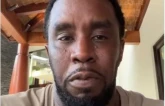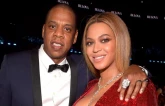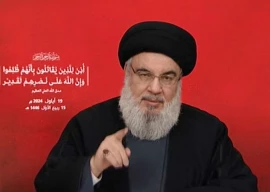1727508256-0/Copy-of-Untitled-(2)1727508256-0.png)
Saudi Crown Prince Mohammed bin Salman reportedly told US Secretary of State Antony Blinken that he does not personally care about what was described as the "Palestinian issue," according to a report by The Atlantic.
The remark was made during a meeting between the two leaders in the Saudi city of al-Ula in January, amidst ongoing discussions regarding the potential normalisation of relations between Saudi Arabia and Israel.
The report, published on Wednesday, provided insights into 11 months of negotiations by the US after the outbreak of war in Gaza. It cited "two dozen participants at the highest levels of government in America and across the Middle East."
During the January meeting, Blinken and the crown prince discussed Saudi Arabia’s possible formalisation of ties with Israel, which had made progress earlier in US-led negotiations.
However, these discussions were derailed by the outbreak of war on 7 October between Israel and Gaza.
In the meeting, bin Salman expressed to Blinken that he desired calm in Gaza if a normalisation deal with Israel were to take place.
When Blinken enquired whether the Saudis could accept periodic Israeli incursions into Gaza to strike the region, the crown prince replied, “They can come back in six months, a year, but not on the back end of my signing something like this.”
The crown prince further explained that 70% of Saudi Arabia’s population is younger than him, noting that this younger generation is now encountering the Palestinian issue for the first time due to the ongoing conflict.
“For most of them, they never really knew much about the Palestinian issue. And so they’re being introduced to it for the first time through this conflict. It’s a huge problem. Do I care personally about the Palestinian issue? I don’t, but my people do, so I need to make sure this is meaningful,” he reportedly said.
However, a Saudi official described this account of the conversation as “incorrect.”
Publicly, Mohammed bin Salman has maintained that Saudi Arabia would not normalise relations with Israel without the establishment of a Palestinian state with East Jerusalem as its capital.
During a recent annual address before the Shura Council in Riyadh, he reiterated Saudi Arabia’s position: "The Kingdom will not cease its diligent efforts to establish an independent Palestinian state with East Jerusalem as its capital. We confirm that Saudi Arabia will not establish diplomatic relations with Israel until that goal is achieved."
According to The Atlantic, Saudi Arabia would seek to enter a mutual defence treaty with the United States as part of any normalisation deal with Israel. Such a treaty would require ratification from two-thirds of the US Senate. The crown prince reportedly told Blinken that such a treaty would likely be ratified under the Biden administration, as US progressives might back it if it included the establishment of a Palestinian state.
Bin Salman also expressed concerns over the personal risks associated with pursuing a normalisation deal with Israel. He referenced the assassination of Egyptian President Anwar Sadat in 1981, which occurred a few years after he signed a peace accord with Israel. “Half my advisers say that the deal is not worth the risk,” he said. “I could end up getting killed because of this deal.”
The report comes amid strong anti-Israel sentiment in Saudi Arabia. Early polling during the Israel-Gaza war indicated that over 90% of Saudis believed that Arab states should cut ties with Israel. Despite this, the Saudi government has taken a tough stance against public displays of Palestinian solidarity. Reports have emerged of individuals being detained for expressing opinions on social media or wearing Palestinian symbols like the keffiyeh in the holy city of Mecca.
When asked about the crackdown, senior Saudi royal Prince Turki al-Faisal told Middle East Eye that he had not personally experienced any restrictions on his expressions of support for Palestine within the Kingdom.
"I haven’t felt myself any restrictions on my expressions of support for Palestine in Saudi Arabia, nor have I seen any particular reporting on that,” he said, adding, “But what I see of the Saudi press, whether written or on television or in social media, is full support for Palestine and no restriction on expressing support for Palestinians.”
Prince Turki also commented on the prospects of Saudi-Israel normalisation, dismissing speculation that Hamas’s attack on southern Israel—which killed approximately 1,140 people—was aimed at derailing Saudi-Israeli normalisation talks.
He argued that such an attack would have required long-term planning, saying, "For Hamas to have done what it did, it would have required [time] to prepare for it. At least a couple of years to gather the human and material resources to launch a campaign like that."
Despite growing US-Saudi discussions about normalisation, Prince Turki cast doubt on the prospects, highlighting Israel’s firm opposition to Palestinian statehood.
“The whole [Israeli] government is saying no Palestinian state. So how can there be normalisation between us and them with those positions in place?” he questioned.


1723807223-0/jimin-(1)1723807223-0-165x106.webp)

1727242355-0/Diddy-(1)1727242355-0-165x106.webp)
1727523993-0/Copy-of-Untitled-(7)1727523993-0-270x192.webp)
1727523119-0/Untitled-design-(30)1727523119-0-270x192.webp)

1727519597-0/BeFunk_§_-(86)1727519597-0.jpg)
1727518642-0/BeFunk_§_-(85)1727518642-0.jpg)
1727518075-0/BeFunk_§_-(84)1727518075-0.jpg)










COMMENTS
Comments are moderated and generally will be posted if they are on-topic and not abusive.
For more information, please see our Comments FAQ